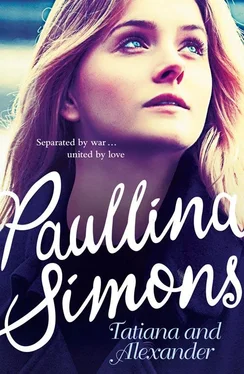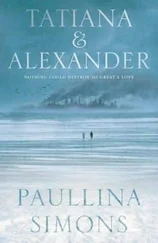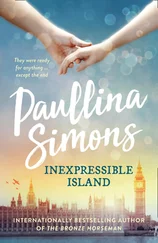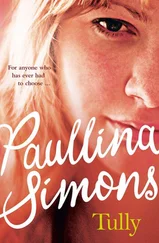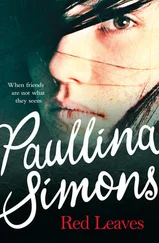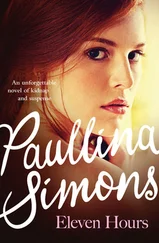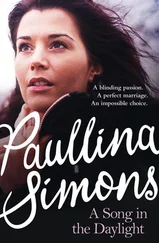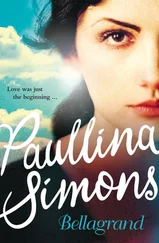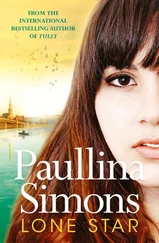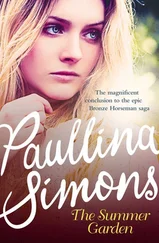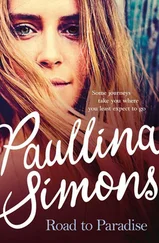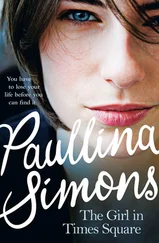“I know who Perseus is.” She nods. “When I was a little girl, I lived inside the Greek myths.” She presses against him. “I like that Perseus is smiling at us while you make love to me.”
“Did you know that the stars in Perseus that are yellow might be close to imploding, but the stars that are blue, the biggest, the brightest—”
“And they are called novas.”
“Yes, they shine, gain in brilliance, explode, then fade. Look how many blue stars there are around the smile, Tatia.”
“I see.”
“Do you hear the stellar winds?”
“I hear rustling.”
“Do you hear the stellar winds, carrying from the heavens a whisper, straight from antiquity … into eternity …”
“What are they whispering?”
“Tatiana … Tatiana … Ta … tiana …”
“Please stop.”
“Will you remember that? Anywhere you are, if you can look up and find Perseus in the sky, find that smile, and hear the galactic wind whisper your name, you’ll know it’s me, calling for you … calling you back to Lazarevo.”
Tatiana wipes her face on Alexander’s arm and says, “You won’t have to call me back, soldier. I’m not ever leaving here.”
CHAPTER ELEVEN
Baseball in Central Park, 1943
JULY HAD GONE BY, and August, too, and September. Seven months since she left the Soviet Union. Tatiana stayed at Ellis, not venturing once across the harbor, until finally Edward and Vikki had had enough of her, and they took her and Anthony—nearly by force—in the ferry one Saturday afternoon to see New York. Against Tatiana’s objections (“Vikki, I don’t have carriage to put Anthony.”) Vikki bought a carriage for four dollars at a second-hand shop. “It’s not for you. It’s for the baby. You can’t refuse a present for your baby.”
Tatiana didn’t refuse. She often wished her boy could have a few more clothes, a few more toys. A carriage perhaps for the walks around Ellis. In the same shop Tatiana bought Anthony two rattles and a teddy bear, though he preferred the paper bags they came in.
“Edward, what’s your wife going to say when she finds out you’re out with not one but two of your nurses, gallivanting around gay New York?” asked Vikki with a grin.
“She will scratch out the eyes of the wench who told her.”
“My mouth is shut. What about you, Tania?”
“I’m not speak English,” said Tatiana, and they laughed.
“I can’t believe this girl has never once been to New York. Tania, how do you keep from going to the Immigration Department? Don’t you need to speak to them every few weeks so they can see how you’re doing?”
Looking at Edward gratefully, Tatiana said, “Justice Department come to me.”
“But three months! Didn’t you want to go to New York and see for yourself what all the fuss is about?”
“I busy working.”
“Busy nursing,” punned Vikki, and laughed at herself. “He is a nice boy. He is not going to fit into the carriage soon. I think he is extra big for his age. All that milk.” She glanced at Tatiana’s abundant chest and coughed loudly.
“I do not know,” said Tatiana, looking at Anthony with swelling pride. “I do not know boys his age.”
“Trust me, he is gigantic. When are you going to come for dinner? How about tomorrow? I don’t want to hear it from Grammy about my divorce anymore. It’s official, you know. I’m divorced. And my grandmother every Sunday dinner says to me that no man shall ever want me again, a tainted divorced woman.” Vikki rolled her eyes.
“Vikki, but why do you have to prove her so wrong?” said Edward. Tatiana stifled a laugh.
“I have eyes but for one man. Chris Pandolfi.”
Tatiana snorted. Edward smiled. “Our Tania doesn’t much like Chris, do you, Tania?”
“Why?” asked Vikki.
“Because he calls me Nurse Buttercup. I think he make fun of me. What is this buttercup?”
Shaking his head and smiling, Edward placed his arm on Tatiana’s back and said, “Happy yellow flower,” but Vikki was already talking about how Chris was going to take her to Cape Cod for Thanksgiving weekend, and how she had found the most exquisite chiffon dress to go dancing in next Saturday.
The market in front of Battery Park was teeming with people.
Tatiana, Vikki, and Edward pushed a sleeping Anthony past the market, through Church Street and then turned down Wall Street and crossed downtown to go to South Street, through the Fulton Fish Market and then up to Chinatown and Little Italy. Edward and Vikki were exhausted. Tatiana walked on, mesmerized by the tall buildings, by the swarming crowds, everyone shouting, cheerful, hot, by the street vendors selling candlesticks, candles, old books, apples, by the musicians on street corners, playing harmonica and accordion. She walked as if her feet did not belong to her and did not touch the hard pavement. She was amazed at the potatoes and peas and cabbages spilling out of bushels onto the sidewalks, by the peaches and apples and grapes, by the horse-drawn carriages selling cottons and linens, by the cabs and cars, thousands of them, millions of them, by the double-decker buses, by the constant clang of the el on Third Avenue, on Second Avenue, amazed, open-mouthed by it all.
They stopped at a coffee house on Mulberry Street, and Vikki and Edward sank into the sidewalk chairs. Tatiana remained standing, her hand on the carriage. She was looking at the bride and groom descending the church steps into the courtyard across the street. There were many people around them. They looked happy.
“You know she’s a tiny girl and looks deceptively as if she will fall down any second, but look at her, Edward. She’s not even out of breath,” said Vikki.
“I, however, have lost several pounds. I have not walked this much since my days in the army,” said Edward.
Ah, so Edward was a military man. “Edward, you walk this much through hospital beds every day,” Tatiana said, not turning away from the couple at the church. “But your New York, it is something.”
“How does it compare to the Soviet Union?” asked Vikki.
“Favorably,” Tatiana replied.
“Someday, you’ll have to tell me about it,” said Vikki. “Oh, look, peaches! Let’s go buy some.”
“New York is always like this?” said Tatiana, trying not to sound wide-eyed.
“Oh, no. It’s only like this because of the war. Usually it’s very lively.”
Two Sundays later, Tatiana went with Anthony and Vikki to Central Park to watch Edward play softball against the health officials at PHD, including Chris Pandolfi. Edward’s wife did not come. He said she was resting.
Tatiana smiled at the passers-by and at the fruit stand sellers. The birds were joyous overhead and life bustled forward in freshwater color spurts, and she bowed her head and held her son with one hand and the peaches in the other, and said, yes, these are ripe and smell sweet. She was contemplating taking a ride with Vikki and Edward up to Bear Mountain one Sunday, when Edward had a few gallons of rationed gasoline and his wife was home resting and the leaves were changing. But this Sunday Tatiana was in Central Park, in New York, in the United States of America, holding Anthony while the sun was bright and Edward played softball, and Vikki jumped up and down at every hit and every catch, and Tatiana was not dreaming.
But where is Anthony’s mom? What’s happened to her? Tatiana wanted that girl back, the girl before June 22, 1941, the girl who sat on the bench in her French-made, Polish-bought white dress with red roses and ate ice cream on the day war started for Russia. The girl who swam with her brother, Pasha, who read away her summer days, the girl with everything in front of her. With the Red Army first lieutenant in his Sunday best Class As standing across the sunlit street in front of her. She could have not bought the ice cream, she could have gotten on the earlier bus and hurtled across town in a different direction toward a different life. Except she had to have bought the ice cream. That was who she was. And because of that ice cream now she was here.
Читать дальше
